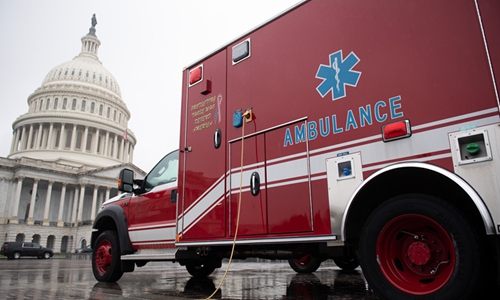What is an alternative for a dying US democracy?
By Wenshan Jia Source:Global Times Published: 2020/4/18 9:43:40

An ambulance sits outside the US Capitol in Washington. Photo: AFP
The quick death for US democracyThe growing consensus in the West is that US democracy is dying. Paul Krugman, a New York Times columnist, has been one of the loudest voices to narrate this trend.
In an op-ed titled "The Death of Democracy, the American Style" in September 2019, Krugman pointed out that with US President Donald Trump's efforts to weaponize the federal government to punish his critics, US democracy has slid to an autocracy. Krugman warns that such behavior would make democracies autocratic in substance and only democratic in name.
Krugman raised the same warning signal in an op-ed titled, "American Democracy may be Dying" on April 10. This time, he used the Republican Party's manipulation of the Wisconsin primary as an example to show that one of the two parties had implemented autocratic principles. This, and the collapse of democracy as the ultimate political institution in the US, according to Krugman, is the most terrifying, and more so than the spread of the novel coronavirus (COVID-19) and its economic consequences.
As a Nobel laureate, Krugman's fear is not unfounded as it resonates with other scholars and their findings. One notable study is the report, "The Global Satisfaction with Democracy Report 2020," released in January by the Centre for the Future of Democracy, Bennett Institute for Public Policy, at Cambridge University, UK.
The UK report found that while the dissatisfaction with democratic politics across the globe has jumped from 47.9 to 57.5 percent, the US has experienced "dramatic" and "unexpected" decline with less than half of its population satisfied with their version of democracy.
With the mishandling of COVID-19 and its dramatic consequences leading to a Wall Street meltdown, and one that will be more serious than the 2008 Financial Crisis, and the temporary closure of the US economy coupled with a sharp unemployment increase, at least an estimated 75 percent of the population would be dissatisfied with their democratic system during the pandemic and post-pandemic era.
Two primary reasons are mentioned in the UK report: 1) promises given are not promises kept by politicians. 2) constituents' income and life quality are deteriorating with skyrocketing income disparities within US society. However, the report found a high and stable level of satisfaction with democracy among Northern European countries.
Contributing factors
The factors leading to the decay of US democracy are manifold, including both internal corruption and external pressure. Internal causes are related to a lack of overall adaptability to evolving situations, elites' blind belief in its perfection, money politics, empty promises, enforcement of coercive tactics for the people's compliance instead of relying on civic consensus building, mass media's manufacturing of consensus, political polarization, nepotism, abuse of power, condoning discrimination, and instigating gun violence.
Externally, US unilateralist foreign policies and the repeated violations of the sovereign rights of other countries such as China under the banner of "liberalize and democratize" contradict and undermine the country's democratic principles.
Previously, this behavior resulted in wars the US fought overseas in Afghanistan and Iraq. To add insult to injury, Trump not only defies the checks and balances function of Congress, exemplified by his block of the impeachment inquiry, but also despises mainstream media which criticizes his policies and leadership, not to mention his blatant nepotism in hiring his son-in-law and daughter as his senior advisors, and his allegedly corrupt under-the-table business dealings.
Trump has already threatened to mobilize his supporters to start a "civil war" if he was voted out of the White House in the upcoming November election.
Prospecting for an alternative
If Krugman's fear is well-founded, his warning should be heeded both in the US and worldwide. In the worst-case scenario, both the US and the world need to prepare for a possible fall-out of President Trump in his presidential re-election campaign.
If Democratic candidate Joe Biden wins in the election, but Trump refuses to pass the baton and move out of the White House and start a riot with his constituents against the Biden government, would there be a practical solution to such a historically unprecedented crisis? What should the world do about this possible American political crisis, which may have huge global implications and impact? Should the UN help? If yes, how?
A less serious scenario would be if Biden and Trump tied just like the Al Gore vs. George W. Bush presidential race in 2000. It would be up to the Supreme Court to decide a winner. However, given the extreme political polarization in the US, it is likely a heavy backlash mixed with violence against the winner, which will be much broader in scope, much deeper in thought, and more long-lasting.
Such an event would be matched only by the economic crisis in 1929. As there will be many more unemployed people and a middle class whose retirement portfolio has already been virtually drained by the Wall Street meltdowns near the end of 2020, any sensitive event could ignite a nationwide uproar of historically unprecedented proportions in US society.
To make the US more governable, whether by Trump or Biden in the next four years beginning in 2021, another New Deal will be necessary. Furthermore, mixing capitalism with socialism institutionally as Northern Europe does and as Bernie Sanders and Elizabeth Warren suggested, seems to be a better alternative. China, on the other end of the political continuum, could be a good example of mixing socialism with the market economy for the US to learn.
The author is adjunct professor with Shandong University and professor with the School of Communication at Chapman University. opinion@globaltimes.com.cn
Posted in: VIEWPOINT